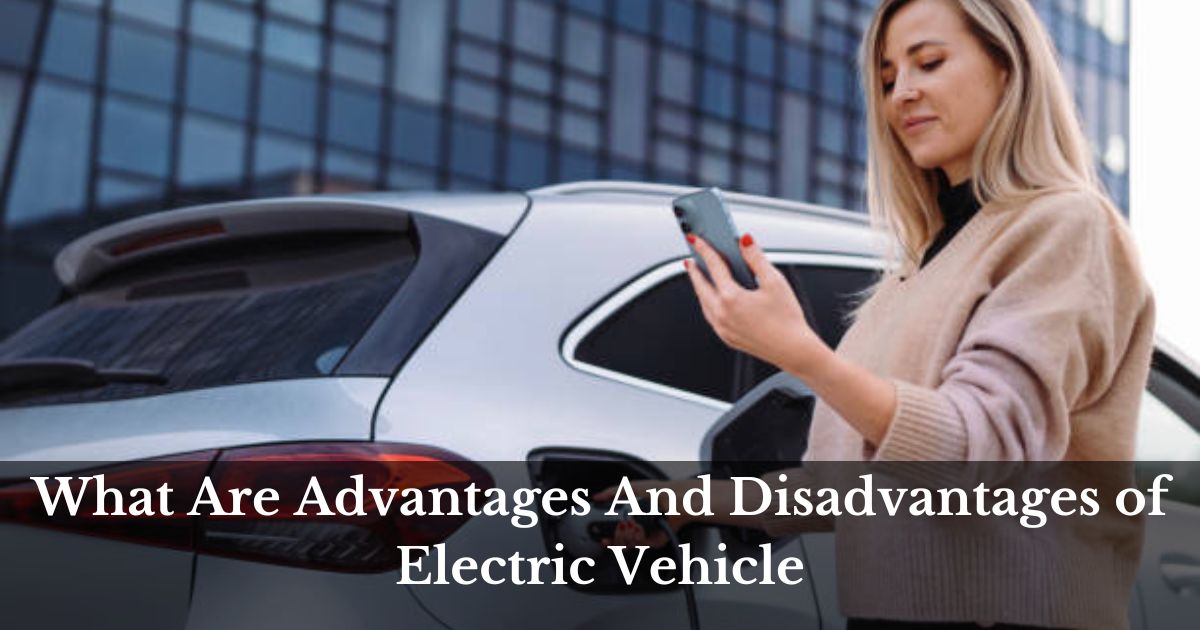What are advantages and disadvantages of electric vehicle, Electric vehicles, or EVs, have been gaining popularity over the years as a cleaner and more sustainable alternative to traditional gasoline-powered cars. But like any technology, EVs come with their own set of advantages and disadvantages. In this article, we’ll explore both sides of the coin to give you a comprehensive view.
Advantages of Electric Vehicles
Environmental Benefits
Reduction in Greenhouse Gas Emissions
One of the most significant advantages of electric vehicles is their environmental impact. EVs produce zero tailpipe emissions, which means they don’t contribute to air pollution or global warming like conventional cars do. By driving an EV, you’re helping to reduce greenhouse gas emissions and combat climate change.
Cleaner Air Quality
In addition to reducing greenhouse gas emissions, electric vehicles also contribute to cleaner air quality. With fewer pollutants being released into the atmosphere, cities and communities can enjoy fresher, healthier air. This is especially beneficial for people with respiratory issues or allergies.
Cost Savings
Lower Fuel Costs
One of the immediate benefits of owning an electric vehicle is the savings on fuel costs. Electricity is generally cheaper than gasoline, which means you’ll spend less money to power your car. Over time, these savings can add up significantly, especially as fuel prices continue to rise.
Maintenance Savings
Electric vehicles also tend to have lower maintenance costs compared to gasoline-powered cars. With fewer moving parts and less wear and tear on the engine, EV owners can expect to spend less on routine maintenance and repairs.
Performance and Efficiency
Instant Torque
Electric motors deliver instant torque, which means you’ll experience quick acceleration and a smooth driving experience. This instant power can make driving an electric vehicle more enjoyable and responsive compared to traditional cars.
Regenerative Braking
Regenerative braking is another feature that sets electric vehicles apart. This technology allows the car to recapture energy during braking and store it in the battery for later use. Not only does this improve overall efficiency, but it also helps to extend the vehicle’s range.
Disadvantages of Electric Vehicles
Range Anxiety
One of the most common concerns among potential EV owners is range anxiety. Unlike gasoline-powered cars that can refuel in minutes, electric vehicles require more time to recharge their batteries. This can be a challenge, especially for long-distance travel or when there are limited charging stations available.
Charging Infrastructure
The availability and accessibility of charging infrastructure can also be a drawback for electric vehicle owners. While there are more charging stations popping up around the country, they’re not as ubiquitous as gas stations. This can make it inconvenient for EV owners, especially those who don’t have a dedicated charging setup at home.
Initial Cost
Electric vehicles tend to have a higher upfront cost compared to their gasoline-powered counterparts. While there are incentives and rebates available to help offset this expense, the initial investment can still be a barrier for some consumers.
Battery Lifespan and Replacement Costs
The lifespan of an electric vehicle’s battery is another concern for potential buyers. Over time, batteries degrade and lose their capacity, which can affect the car’s range and performance. Additionally, replacing a battery can be costly, making it a long-term investment that owners need to consider.
Electric vehicles offer a range of advantages, from environmental benefits and cost savings to improved performance and efficiency. However, they also come with their own set of challenges, such as range anxiety, charging infrastructure, and initial costs. As technology continues to advance and infrastructure improves, many of these disadvantages are expected to diminish. Ultimately, the decision to switch to an electric vehicle will depend on your individual needs, lifestyle, and priorities.
FAQs
Are electric vehicles really better for the environment?
Yes, electric vehicles produce zero tailpipe emissions, making them better for the environment compared to gasoline-powered cars.
How long does it take to charge an electric vehicle?
Charging times can vary depending on the vehicle and charger, but it typically takes several hours to fully charge an electric vehicle.
What is range anxiety?
Range anxiety refers to the fear or concern of running out of battery charge while driving an electric vehicle, especially in areas with limited charging infrastructure.
How much does it cost to maintain an electric vehicle?
Electric vehicles generally have lower maintenance costs compared to gasoline-powered cars due to fewer moving parts and less wear and tear on the engine.
Are there government incentives available for electric vehicle purchases?
Yes, many governments offer incentives and rebates to encourage consumers to switch to electric vehicles, which can help offset the higher upfront costs.



